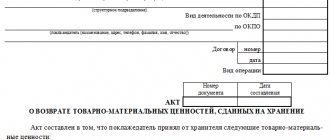List of documents that need to be stored
The requirement to store accounting documents for periods established in accordance with the rules for organizing state archival affairs, but not less than 5 years after the reporting year, is enshrined in Art.
29 of the Law “On Accounting” dated December 6, 2011 No. 402-FZ. At the same time, the rules of archival affairs mean, first of all, the list of documents and their storage periods approved by Rosarkhiv (order No. 236 dated December 20, 2019, entered into force on February 18, 2020). The storage period for tax documents, reporting and annexes (additions) to it is also specified in the Tax Code. In particular, in Art. 23 of the Tax Code of the Russian Federation states that documents (tax and accounting) on the basis of which taxes were calculated should be stored for at least 4 years.
Important! ConsultantPlus warns The absence of documents necessary for the calculation and payment of taxes may result in prosecution for gross violation of the rules for accounting for income and (or) expenses and (or) objects of taxation established by clause 1 or clause 2 of Art. 120 Tax Code of the Russian Federation. And if the tax base is distorted, you face... Read more about liability in K+. Trial access is free.
A number of federal laws also contain clear instructions on the list of documents that must be retained for a certain period of time (or for a long period of time). So, in paragraph 1 of Art. 50 of the Law “On LLC” dated 02/08/1998 No. 14-FZ (hereinafter referred to as the Law on LLC) states that it is mandatory to preserve accounting documents among the constituent documentation:
- confirming the rights of the LLC to the property listed on its balance sheet;
- internal documentation of the business entity;
- documents on the issue of securities;
- other documentation, the need for storage of which is stipulated by federal laws, the charter of the economic company, and local regulations of the company.
In paragraph 1 of Art. 89 of the Law “On JSC” dated December 26, 1995 No. 208-FZ (hereinafter referred to as the Law on JSC) it is stated that among the mandatory storage of constituent documents the following accounting documentation is mentioned:
- documents confirming the company’s rights to assets that are listed on its balance sheet;
- all internal documentation;
- annual reports and other accounting documents;
- accounting documents;
- other documentation, the mandatory preservation of which is specified in the charter and/or local regulations.
You will find more information about what types of accounting documents are in the article “Unified forms of primary documents (list)”.
Archiving procedure
The procedure for archiving documents is the same for all companies, but each organization can make its own adjustments. The standard procedure is divided into the following stages:
- Initially, the features of documents that are prepared for transfer to the archive are highlighted;
- if necessary, additional actions are carried out, consisting of stitching papers or making various additions;
- Documents are adjusted, making it easy to find the necessary papers in the general mass of documentation in the future;
- unnecessary documents are destroyed legally, since they do not represent any value for the operation of the enterprise;
- documents are systematized, after which they are stitched together based on their type;
- papers are divided into the following types: accounting, personnel or management;
- if it is impossible to classify any papers as the above types, then they are combined and entered into a separate file;
- Each stitch is affixed with the seal of the organization, as well as the signature of an authorized employee;
- an inventory is generated for each case, containing information about which documents are located in a specific folder;
- catalogs of cases are made, distributed by type;
- all correctly prepared cases are sent for storage to the archive, which is usually represented by a separate room containing a large number of convenient shelving.
The procedure is implemented only by an authorized person vested with the necessary powers by the head of the organization. If any rules for archiving documents are violated or documentation is completely lost, then it is this employee of the enterprise who is responsible for the identified violations.
Limit periods for storing documents
In accordance with FCSM Resolution No. 03-33/ps dated July 16, 2003, JSCs have a retention period for accounting documentation of at least 5 years.
According to information from the list of Rosarkhiv:
- orders and instructions for the main type of activity must be kept permanently, for personnel - up to 75 years, for economic and administrative issues - up to 5 years;
- the staffing table is permanent, and job descriptions and staffing levels are up to 75 years;
- agreements on the transfer of rights to the results obtained from intellectual property - 5 years after the expiration of the agreement;
- documents that are prepared to obtain a license - up to 5 years, and the licenses themselves - permanently;
- documentation on the transfer of assets into trust management - 10 years;
- documents on transactions with securities - before the liquidation of the organization;
- documents on economic activities - 3–5 years;
- cases of archival storage of documents - permanently;
- annual statistical reports, estimates - constantly;
- documentation on long-term lending and investment activities - constantly;
- reports on the implementation of government orders - constantly;
- consolidated (annual) financial statements - constantly;
- declarations for all types of taxes - 5 years, etc.
You will find a complete guide to documentation retention periods in ConsultantPlus. Trial access to the legal system is free.
The fact that companies must comply with the legally established periods for storing accounting documentation is stated in letters from the Ministry of Finance dated March 30, 2012 No. 03-11-11-104 and dated July 22, 2013 No. 03-02-07/2/28610.
We recommend storing accounting documentation for at least 5 years so as not to fall under the sanctions of inspection authorities.
However, for some situations it is possible to use other storage periods:
- Documents accompanying the transaction for the capitalization of depreciable assets are stored for another 4 years after the property was written off the balance sheet as a result of liquidation/alienation (based on Article 23 of the Tax Code and letter of the Ministry of Finance dated April 26, 2011 No. 03-03-06/1 /270).
- Primary documentation for the unprofitable period of the company's operation must be stored for the entire period of time while the results of unprofitable activities are used to reduce income tax (based on Article 283 of the Tax Code and letter of the Ministry of Finance dated May 25, 2012 No. 03-03-06/1/278) .
- The initial document necessary to write off bad debts of debtors must be kept for another 4 years after the debt was recognized as bad. In this case, the storage period is extended if the statute of limitations on the debtors’ obligations was interrupted and began to be counted anew (the basis is subparagraph 2, paragraph 2, article 265 of the Tax Code and article 203 of the Civil Code of the Russian Federation).
The starting date for determining the storage period of accounting documentation is considered to be January 1 of the year that follows the period of its preparation/acceptance for accounting (Rosarkhiv order No. 237 dated December 20, 2019).
Retention period for certificates of work performed in the organization
Contents This question is asked by all entrepreneurs, without exception, who have recently opened an enterprise and have not understood the intricacies of the system. So how long to keep LLC documents, a year, two or more?
You can understand this issue in detail by reading Federal Law No. 125-FZ “On Archiving in the Russian Federation” point by point.
The storage periods for accounting documents vary. What can be said by combining all the subpoints? Accounting documents must be kept in an LLC at least as long as there is a possibility that a tax audit may require them. According to Article 89 of the Tax Code of the Russian Federation, inspection is subject to a period not exceeding three years preceding the decision to conduct this inspection.
That is, we store it for exactly three years, and then the fun begins. Article 23 of the Tax Code of the Russian Federation, subclause 8 of clause 1, clearly informs us that tax payers are required to keep documentation confirming the accrual of taxes for four years and no less.
Features of storing various accounting documents
The rules for storing accounting documentation applied at the enterprise in accordance with current legislation should be prescribed in a separate local act. For such purposes, the provision on archiving documents is suitable.
In accordance with the adoption of a number of norms in domestic legislation, enterprises can use documentation in electronic form. Primary documentation can be stored in this form on the basis of Art. 9 of the Law on Accounting, accounting registers - Art. 314 of the Tax Code of the Russian Federation and tax reporting transmitted via electronic communication.
Electronic documents must be certified with a digital signature - this is stated in the letter of the Ministry of Finance dated August 22, 2012 No. 03-02-07/1-202. But if a request is received from the inspector to provide such documentation in printed form, it must be printed by the taxpayer and certified in accordance with all the rules. The storage periods for electronic documentation are the same as for analogues in printed form.
Information on storing personnel documentation is contained in the article “What is the storage period for personnel documents in an organization?”
How is the archive storage equipped?
The company selects a separate room for storing documents.
When equipping it, the following rules are taken into account:
- the room or building is used exclusively for the needs of the archive;
- It is not allowed to use dilapidated or unheated rooms for these purposes;
- It is not allowed to choose premises that are located next to catering establishments or rooms intended for storing food or aggressive substances;
- the room must meet fire safety requirements, as this ensures the protection of documentation from fires or flooding;
- a ventilation system must be equipped;
- In the process of finishing various surfaces, it is not allowed to use any flammable or hazardous materials.
To check the suitability of the premises for organizing an archive, a special examination is carried out by specialized services.
The sanitary condition of the room, its availability of various equipment and compliance with fire safety requirements are taken into account. Based on this check, a report is drawn up.
Distribution
The procedure consists of thematic distribution of documentation. To do this, the archive worker checks all the papers, after which all elements related to any event are collected together.
How to create a correct production specification? Read here.
This processing makes it possible in the future to find all documents related to different incidents and events, which greatly simplifies the search procedure.
Organization
The work of the archive is based on the regulations issued by the head of the company. With the help of this regulation, an employee is appointed who becomes an archivist. It is he who is responsible for ensuring that all documents remain safe.
The archive in each organization is formed as a specialized department, but if too few documents are stored, then the processing and storage procedure can be carried out by the administrative staff of the company.
The main purpose of such a service is the creation, recording and storage of company data. The archivist must systematically develop a nomenclature of files, accept documentation, systematize papers and issue them upon request.
He is involved in the destruction of papers that have lost their legal significance.
Nuances of control
The work of this unit is based on internal regulations and laws.
How to file an archive folder correctly? Answer in video:
The correct storage of documentation is monitored on the basis of Federal Law No. 125 by state authorities. Usually the procedure is carried out by the tax office and the Pension Fund.
Where should accounting documents be stored?
Accounting documents related to the business activities of the LLC must be stored at the address where the sole executive body is located or in a place that is known and where all members of the company can get (clause 2 of Article 50 of the LLC Law). As for accounting documentation and other documents of joint-stock companies, it must be stored at the location of the executive body (clause 2 of Article 89 of the Law on JSC).
Documentation should be stored in a specially equipped room or closed cabinets (clause 6.2 of the letter of the Ministry of Finance dated July 29, 1983 No. 105). How to arrange such storage facilities is discussed in detail in the rules, which were approved by the decision of the Rosarkhiv board of 02/06/2002.
What documents need to be kept in the accounting department?
The list of documents required for storage is regulated by Art. 89 of the Law of December 26, 1995 No. 208-FZ, Art. 50 of the Law of February 8, 1998 No. 14-FZ and includes:
- accounting documents;
- documents containing data on the organization’s income and expenses;
- tax documents;
- primary documents and financial statements;
- documents with information about company registration with the tax authorities;
- data on payments to the Social Insurance Fund, Compulsory Medical Insurance Fund, Pension Fund.
How to prepare documents for archiving?
An archive can be called a special room in a company’s office reserved for storing documentation, a structural unit of an enterprise as part of an office/records service, as well as a specialized government agency. Documents with a shelf life of at least 10 years are transferred for archival storage. Documents that can be stored for a shorter period of time can be kept in the accounting department until they are destroyed.
To transfer accounting documentation to the archive, you will need to perform a number of actions (clause 3.4.2 of the order of the Main Archive of the USSR dated May 25, 1988 No. 33), including:
- drawing up an inventory;
- numbering pages and stapling the case;
- cover design.
If the enterprise has already undergone inspections by fiscal and other regulatory authorities, then documentation that does not fit in the office can be transferred to the archive. To transfer documents to the state archive (municipal archive), they must be formed into files. Documents are accepted according to the inventory.
If the storage period for documents has expired, they are usually destroyed, having previously created a commission for this purpose.
You will find details about the procedure for destroying documentation in our article “Destruction of documents with expired storage periods (act).”
Rules for publishing the “Regulations on the Archive”
In large companies, the archive is represented by a separate room in which a huge number of files and documents are stored for a long period of time. At the same time, the organization employs a specialist who deals exclusively with archiving documents. To ensure that its work is clearly regulated, company managers often issue and enshrine a special “Regulation on the Archive.” The rules for its use include:
- it is indicated exactly what work must be performed by the responsible person;
- provides rules for transferring documents from different departments to the archive;
- the rules for drawing up the inventory and nomenclature of cases are listed;
- information is entered on the correct preparation of papers that are transferred to the archive;
- it is indicated that the appointed employee must be responsible for verifying the composition of documents, as well as their execution.
If the archive employee determines that there are any violations in the documentation, then the papers are sent for revision to the appropriate department of the company. If there are no errors or omissions, then the papers are accepted for stitching. If the information is difficult to read, a copy of the document is made.
Results
The rules for storing accounting documentation are contained in a number of regulations, among which are the Accounting Law and the Tax Code of the Russian Federation. Failure to comply with the storage deadlines for documents (their early destruction) is fraught with additional taxes and fines.
Sources:
- Federal Law of December 6, 2011 No. 402-FZ
- Federal Law of 02/08/1998 No. 14-FZ
- Federal Law of December 26, 1995 No. 208-FZ
- Order of the Federal Archive Agency dated December 20, 2019 No. 236
- Order of the Federal Archive Agency dated December 20, 2019 No. 237
- Basic Rules for the work of archives of organizations (approved by the decision of the Board of Rosarkhiv dated 02/06/2002)
You can find more complete information on the topic in ConsultantPlus. Free trial access to the system for 2 days.
The main goals of the examination of the value of documents
In the office work of an organization or enterprise, in state archives, it is impossible to do without a specialized expert assessment of documents.
The main purpose of the examination:
- Determining or changing the period for further storage of a document.
- Selection of documents to be destroyed that are of no value or the practical content of the information in them has lost its relevance.
- Determining the storage period for documents that do not have scientific or historical value, but are of practical importance.
- Evaluation of documentation that has:
- political;
- economic;
- scientific;
- cultural and other value
The issues of storage, acquisition, recording and further assignment of documents are regulated by the Law on Archival Affairs.





